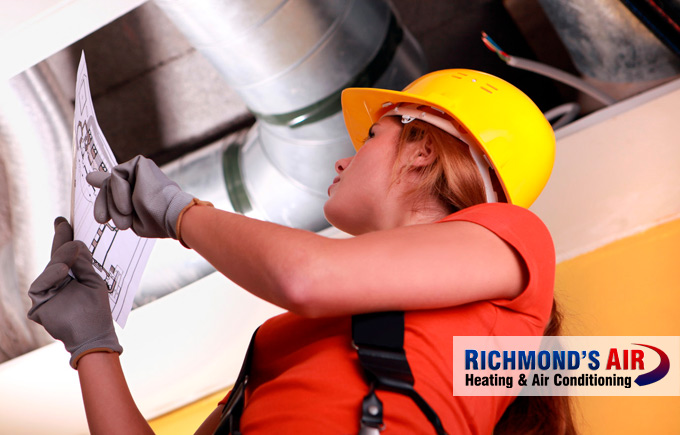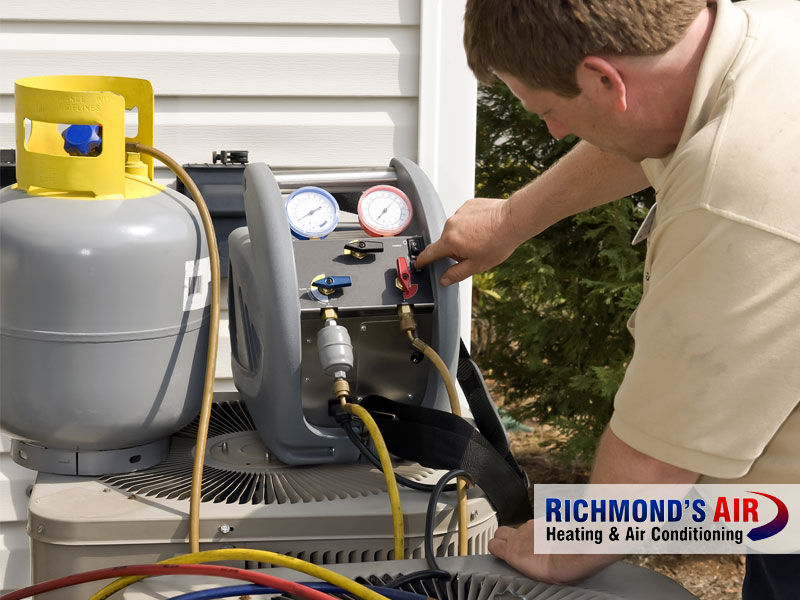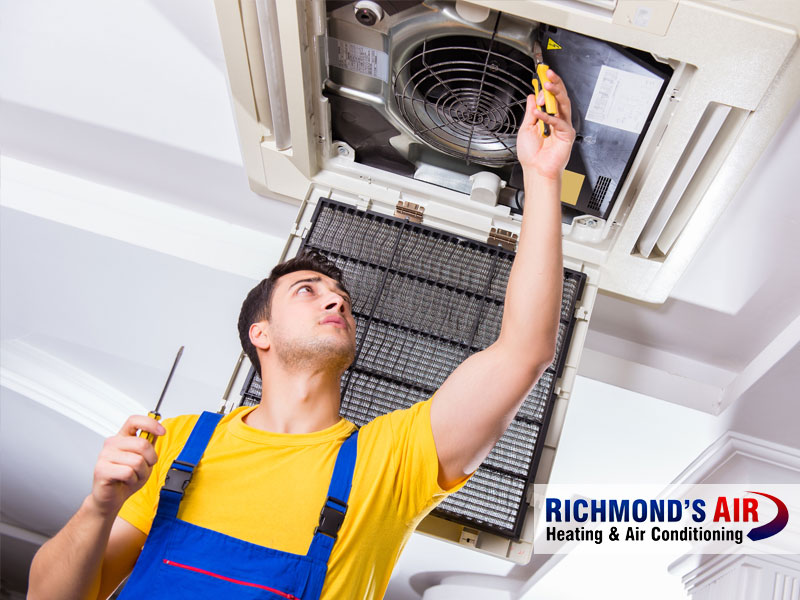
Air conditioning is essential to modern living, especially in regions with hot and humid weather. In Texas, where temperatures can soar in the summer, having a reliable cooling system is a matter of comfort, health and safety.
There are few things worse than suddenly having your air conditioner or heater go on the fritz on a sweltering hot or freezing cold day. When this happens, it may be time to look into getting a new HVAC (heating, ventilation and air conditioning) unit installed.
Continue reading to learn about the costs of installing a new system and get a few tips to help you save time and money.
Is it more cost effective in the long run to repair or replace my HVAC?
Clients often struggle with when it’s better to spend money repairing an older HVAC unit or replace it with a new one. The HVAC repair technicians at Richmond’s Air are more than happy to help you compare the costs and benefits of keeping or replacing your air conditioner, but here are some key factors you can start considering:
The age of your unit
If your air conditioning unit is 10 to 12 years old (or more), then you can consider it has fulfilled its life expectancy. When you start having problems with a system of this age, it’s probably time to upgrade. While you might be comfortable with your existing system, you’ll likely wonder how you got along before you had a new system installed when it’s all said and done.
Newer air conditioning systems are much more efficient, environmentally friendly and comfortable. They’re more likely to have a constant flow of conditioned air, and they’re able to adjust more for indoor humidity conditions. And when it comes to your energy bills, you can expect to save an estimated 20% if you upgrade to an Energy Star-qualified system.
Does your repair exceed the $5,000 rule?
If you don’t know the value of your A/C, another way to determine if you should replace or repair it is to use the “rule of $5,000.” Multiply the age of your unit by the anticipated repair costs. If the resulting amount exceeds $5,000, you’re probably better off replacing it.
If, for example, your unit is 7 years old and the repair cost equals $400, then your “rule of $5000” cost equals $2,800, so you should repair it. If you have a 14-year-old air conditioner and your repair is $400, then your “rule of $5000” cost would be $5,600, and you should consider replacing the system.
The estimated A/C repair cost
A general rule of thumb in the HVAC industry is that when your repair costs equal or exceed 50% of the value of your air conditioning system, then it’s time to replace instead of repair. But if your A/C unit can be repaired effectively at a generally low cost, then opt to repair it as long as no other issues are anticipated in the near future.
Air conditioner reliability and warranty
If this isn’t your A/C’s first repair and you feel you’re getting a little too familiar with your HVAC repairman, it might be time to consider a new unit. Then again, many A/Cs come with a 5-year warranty. If your repairs fall under the warranty, even if it’s the seventh repair, there’s no financial reason to consider replacing your unit yet.
Coolant leaks
Since 2010, A/C manufacturers have switched over to a more environmentally friendly coolant called R-410A. Production of the old R-22 coolant is being phased out, making it more expensive. Because its production will cease in 2020, its expense will continue to grow.
If your A/C runs on R-22, having to replace coolant because of a leak can be prohibitively costly. Adding more refrigerant to the unit can cost anywhere from $40 to $175 a pound. That means repairing the leak and adding a few pounds of refrigerant could be enough of a repair cost to recommend replacement.
Financial considerations
Sometimes you have to repair your air conditioner simply because that is all your budget will allow. You should know that at Richmond’s Air, we can help with this cost by exploring a variety of financing options available on new A/C models. Contact our office for more information.
How much does a new American Standard AC unit typically cost?
One of the most popular AC brands in the U.S. is American Standard, known for its high-quality products and energy efficiency. The cost of a new American Standard air conditioner unit varies depending on factors such as the HVAC company you choose and the condition of your current air conditioning setup (air ducts, installations, etc.), as well as model, size and installation, but typically range from $4,000 to $10,000 for installed units.
Which size American Standard AC units are recommended based on a home’s square feet?
The size of your AC unit should be based on the square footage of your home. We recommend the following American Standard AC sizes for homes based on their square footage:
| Suggested AC unit size | Size of home in square feet |
|---|---|
| 1.5 tons | 600-1,000 |
| 2 tons | 1,000-1,300 |
| 2.5 tons | 1,300-1,600 |
| 3 tons | 1,600-1,900 |
| 3.5 tons | 1,900-2,200 |
| 4 tons | 2,200-2,600 |
| 5 tons | 2,600-3,200 |
What’s the difference between single-stage compressors, 2-stage compressors, and variable capacity compressors?
The compressor is the heart of your AC system, responsible for circulating refrigerant to cool your home. There are 3 main types of compressors:
- Single-stage compressors are the most common and least expensive option. They operate at full capacity to cool your home but turn off when the desired temperature is reached.
- 2-stage compressors have 2 levels of cooling power. They can run at a lower level for milder days and full capacity for hotter days, providing better temperature control and energy efficiency.
- Variable capacity compressors are the most advanced and efficient option. They can adjust their cooling power to match the exact cooling needs of your home at any given moment, resulting in the highest energy efficiency and the most comfortable temperature control.
Factors that affect installation costs
The cost of the new system you choose is only one part of the overall expense of a new central air system installation. You also have to consider the pre-installation work (evaluation, consultation, cost analysis, etc.).
In addition, you may need to factor in possible air duct repair or installation and the cost of hiring an HVAC professional to complete this vital step.
Initial evaluation
First, a qualified HVAC team needs to perform a Manual J Load Calculation, a test where the contractor identifies the amount of heat a house takes in throughout the day. The results of this evaluation will help identify the required size of the air conditioner. A good audit can cost a few hundred dollars. Even so, you might want to check with your utility company to see if there are discounts available.
During the audit, the AC technician will identify air leaks, duct problems and any other issues that could affect the installation of the new air conditioner unit.
My AC is leaking water. What to do?
Have you noticed that your air conditioner or heater is leaking water? There could be several possible reasons for this.
Home AC ducts
The contractor also needs to check your home’s ducts to make sure they can handle a new central air conditioning unit. Older ducts often have issues with managing the airflow of a new air conditioner.
Upgrades or new ductwork installations to aid in the functioning of a new system will increase the overall cost of the installation. However, new installations can also help you avoid higher energy bills and inefficient cooling, so it may balance out in the end.
AC unit choice
Following the audit, you’ll want to select your new AC unit. An experienced HVAC technician should suggest an AC unit that best fits the structure and size of your home.
There are several options to choose from:
- Split AC systems. A split AC system is an AC system with 2 main components: an outdoor unit and an indoor unit. The outdoor unit typically contains the compressor and condenser, while the indoor unit contains the evaporator and air handler. These units are connected by a refrigerant line that circulates refrigerant between the 2 units. Split AC systems offer several advantages over other types of AC systems, including quiet operation, energy efficiency and individual temperature control for different rooms or zones.
- Heat pump systems. A heat pump system is a type of heating and cooling system that transfers heat from one place to another using electricity. It operates by moving heat energy from the outside of your home to the inside, or vice versa, depending on whether you’re trying to heat or cool your house. Heat pumps offer several benefits, such as energy efficiency, reduced carbon footprint and cost savings in the long term. Additionally, some heat pump systems can provide hot water for domestic use.
- Packaged central AC systems. A packaged central AC system is a type of AC system that combines all of the components of a split system into 1 outdoor unit. This includes the compressor, evaporator coil and air handler. Packaged central AC systems are typically installed on the roof or outside the home and are commonly used in commercial buildings or homes with limited indoor space. (Commercial HVAC services are not currently offered by Richmond’s Air)
What to expect when replacing your central heat/air
How long does it take to replace your AC unit, and what steps are involved? Here, we present the entire process from start to finish, so you know exactly what to expect.
Another factor that will influence which type of AC system you need will be the size. The ability to cool is measured in tons. Most systems range from 1.5 to 5-ton capacities, but bigger is not always better. The air conditioner size should always be determined by the audit.
Read more about how to calculate what size AC system you need.
Don’t just choose an AC system simply for its Seasonal Energy Efficiency (SEER) rating. A higher SEER rating could cost more if improperly installed, especially when your home has a number of air leaks. An honest HVAC professional should carefully evaluate your home before giving you a quote on a unit. They should propose an AC system that fits the needs of your home and family.
Installation
Aside from the above costs, you will also need to budget for installation. HVAC contractors offer many different pricing points, but you don’t necessarily want to base your choice on the lowest bid either. About half of all central AC system installations are not installed correctly, and an inefficient setup means an efficiency loss of almost 30 percent.
Here is an approximate breakdown of the different costs:
- Existing system installation. Adding a central air conditioning unit to your current ductwork usually ranges from $4,000 to $8,000.
- Unit and ductwork. Installing new ductwork along with the unit ranges from $9,000 to $12,000.
What are the typical installation and unit costs for each size?
The cost of installing a new AC system depends on the unit’s size and other factors, such as the type of compressor, ductwork and labor. Here are the typical installation and unit costs for American Standard AC units of various sizes:
- 1.5-ton units cost approximately $1,250 plus $3,500+ for installation.
- 2-ton units cost approximately $1,400 plus $3,600+ for installation.
- 2.5-ton units cost approximately $1,500 plus $3,800+ for installation.
- 3-ton units cost approximately $1,700 plus $4,000+ for installation.
- 3.5-ton units cost approximately $1,850 plus $4,200+ for installation.
- 4-ton units cost approximately $2,000 plus $4,600+ for installation.
- 5-ton units cost approximately $2,600 plus $5,700+ for installation.
What factors into the cost of installing new ductwork?
The cost to install new ductwork can vary widely depending on several factors, including:
- The size of your home
- The number of vents and returns needed
- The type of material used for the ducts
How does the type of material influence the cost of new ductwork?
The type of material used for your new ductwork will impact the overall cost of installation. The 3 most common types of ductwork materials are flexible polyester, fiberglass and sheet metal:
- Flexible polyester ductwork is the least expensive option and is ideal for small spaces or when tight installation space is required. It is also relatively easy to install and lightweight. The average cost for installing flexible polyester ductwork is around $1 to $4 per linear foot.
- Aluminum ductwork is a mid-range option known for its durability and energy efficiency. It is more challenging to install than flexible polyester ductwork, and its insulation requires professional installation. The average cost for installing aluminum ductwork is around $2 to $5 per linear foot.
- Galvanized steel ductwork is the most expensive option but is also the most durable and long-lasting. Its installation is labor-intensive and requires specialized tools and equipment. The average cost for installing sheet metal ductwork is around $3 to $10 per linear foot.
What other components may affect installation costs?
In addition to the cost of the AC unit and ductwork installation, several other components can affect the total cost of installing a new central AC system. These components include vents, insulation, electrical wiring, permits and maintenance.
- Vents. The number and size of vents required for your home can impact installation costs. Larger homes or commercial properties may require more vents, increasing the installation cost.
- Insulation. Proper insulation is crucial for maintaining energy efficiency and preventing air leaks. Poor insulation can lead to increased energy bills and a less efficient cooling system.
- Electrical wiring. Upgrading your electrical wiring to accommodate a new central AC system can also increase installation costs.
- Permits. Depending on where you live, you may need to obtain permits from your local government to install a new AC system. Permit costs can vary depending on your location and the complexity of the installation.
- Maintenance. Proper maintenance is crucial for extending the lifespan of your AC unit and ensuring its optimal performance. Routine maintenance can include cleaning, filter replacement and regular inspections.
What services are included in a new outdoor AC unit replacement?
Several services are typically included in the replacement process when you install a new outdoor AC unit, including:
- Assisting with the selection and purchase of a new unit based on your home’s size and other factors
- Removing and disposing of the old unit
- Installing the new unit
- Reconnecting any refrigerant lines, electrical wiring and ductwork
- Testing the new unit to ensure it works properly
How to lower the cost of a new AC installation
Consider scheduling your installation in the off-seasons of spring and fall, if possible. HVAC companies aren’t as busy during these times of the year, so they might offer discounts and specials that reduce your costs—or, at the very least, you’ll have a faster turnaround time for installation. Of course, you can’t always predict when your AC or heating system will break down. At Richmond’s Air, we’re available any time of the year.
Another piece of advice is to look for rebates, incentives and discounts from municipal and state governments, local utility companies and AC manufacturers who are promoting the use of efficient AC systems. Purchasing a new energy-efficient system will not only save you in the long term but could lower your upfront costs if you can cash in on these offers.
Contact the HVAC experts at Richmond’s Air
At Richmond’s Air, all of our technicians have a minimum of 5 years of experience in the air conditioning industry, and we guarantee our installation services will be done with top-notch precision.
Contact us today to schedule an appointment.
 Read reviews
Read reviews









